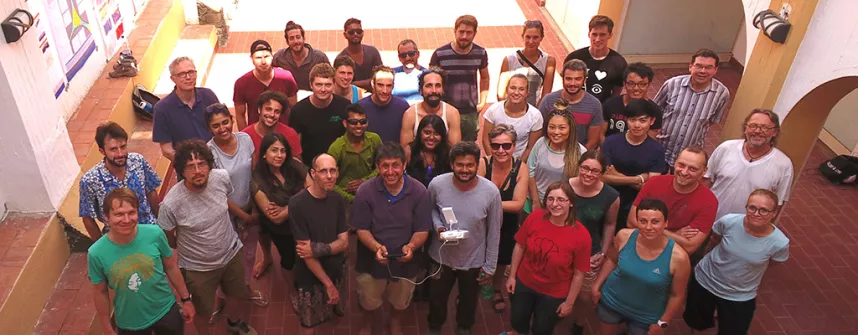Field research in the crater and on the seabed
October 16, 2019
Out of the lecture hall, into nature: on the Italian volcanic island of Vulcano, researchers from Jacobs University Bremen and the German Aerospace Center taught students practical science.
Hot sulphur gases rise from crevices in the rock and color the rock in all shades of yellow. The thermometer shows over 30 degrees Celsius, it smells of rotting eggs. The crater on Vulcano, one of the Aeolian Islands off Sicily, resembles the surface of the Moon and Mars. This is precisely why Dr. Vikram Unnithan, Professor of Geosciences at Jacobs University, and his colleagues chose the island for their international summer school. "We teach the participants what is sometimes neglected in their studies: practical experience in handling scientific equipment in extreme environments," says Unnithan.
Together with Prof. Dr. Laurenz Thomsen from Jacobs University and Dr. Frank Sohl from the German Aerospace Center, the scientist organized the two-week Vulcano Summer School. It was supported by Europlanet, a project funded by the European Union's Horizon 2020 research and innovation program.
The Summer School brings together scientists from a wide range of disciplines –planetologists, marine and geoscientists –with students learning techniques such as the use of robots and drones. And who will become familiar with what it means to research in the field. "If an instrument is damaged or defective on site, solutions have to be found," says Unnithan. "We impart this kind of know-how and it is very sustainable: what the students see and learn in the practical applications stays with them.”
The fifth Summer School now had 46 participants, including many students of the Earth and Environmental Science program at Jacobs University, and even participants from the USA. Divided into small teams, they localized, quantified and analyzed the occurrence of carbon dioxide and its formation in the volcanic environment. Spectrometers were used to determine the composition of stones, a technique that is also used in space missions.
Not only the crater was researched, but also, with the help of a research vessel, underwater regions off Vulcano from which hot gases escape. Led by the robot experts Prof. Dr. Francesco Maurelli and Dr. Szymon Krupiński from Jacobs University, the participants explored the seabed with remote-controlled underwater robots, among other things. "Both planetary scientists and marine scientists are conducting research in inhospitable regions, both using remote-controlled tools," Unnithan explains the cooperation.
According to Unnithan, interdisciplinary thinking and work are necessary in order to understand the topics and solve problems. "We need people who are able to look at a problem from different perspectives," he says. Thus, the Vulcano International Summer School was also concerned with strengthening interdisciplinary cooperation.
About Jacobs University Bremen:
Studying in an international community. Obtaining a qualification to work on responsible tasks in a digitized and globalized society. Learning, researching and teaching across academic disciplines and countries. Strengthening people and markets with innovative solutions and advanced training programs. This is what Jacobs University Bremen stands for. Established as a private, English-medium campus university in Germany in 2001, it is continuously achieving top results in national and international university rankings. Its more than 1,400 students come from more than 100 countries with around 80% having relocated to Germany for their studies. Jacobs University’s research projects are funded by the German Research Foundation or the EU Research and Innovation program as well as by globally leading companies.
Contact:
Heiko Lammers | Corporate Communications & Public Relations
h.lammers [at] jacobs-university.de | Tel.: +49 421 200-4532
